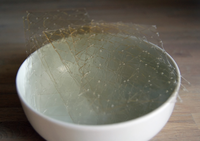
Photo from wikipedia
The influence of alkali extraction conditions on the formation of lysinoalanine (LAL) and the structural characterization of lysinoalanine-containing protein in rice residue protein isolates (RRPI) were explored in this study.… Click to show full abstract
The influence of alkali extraction conditions on the formation of lysinoalanine (LAL) and the structural characterization of lysinoalanine-containing protein in rice residue protein isolates (RRPI) were explored in this study. It was found that LAL content increased from 0.256 to 13.079 g/kg as NaOH concentration increased from 0.03 to 0.09 M and then decreased to 1.541 g/kg at 0.13 M NaOH. The extraction temperature and time were found to have a positive correlation with LAL content. The highest LAL content (25.679 g/kg) was observed with alkali extraction using 0.09 M NaOH at 75 °C for 120 min. The comparative structural analysis results showed that alkali treatment could degrade cystine, lysine, threonine and arginine to generate LAL; increasing alkali content would cause variations in secondary structure and micropore appearance on the surface of lysinoalanine-containing protein, whereas increasing alkali treatment temperature and time could enlarge the surface particle size of the protein.
Journal Title: Food chemistry
Year Published: 2018
Link to full text (if available)
Share on Social Media: Sign Up to like & get
recommendations!